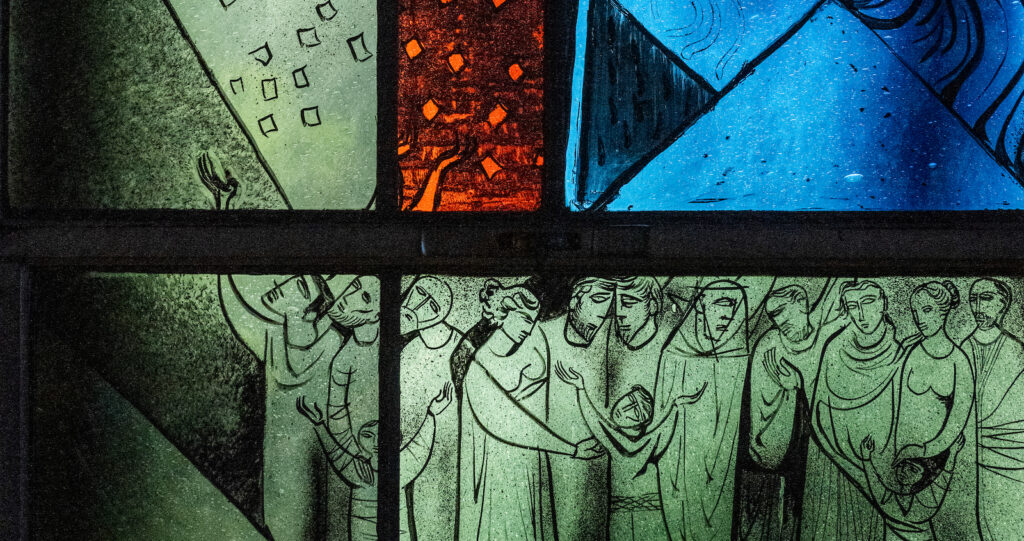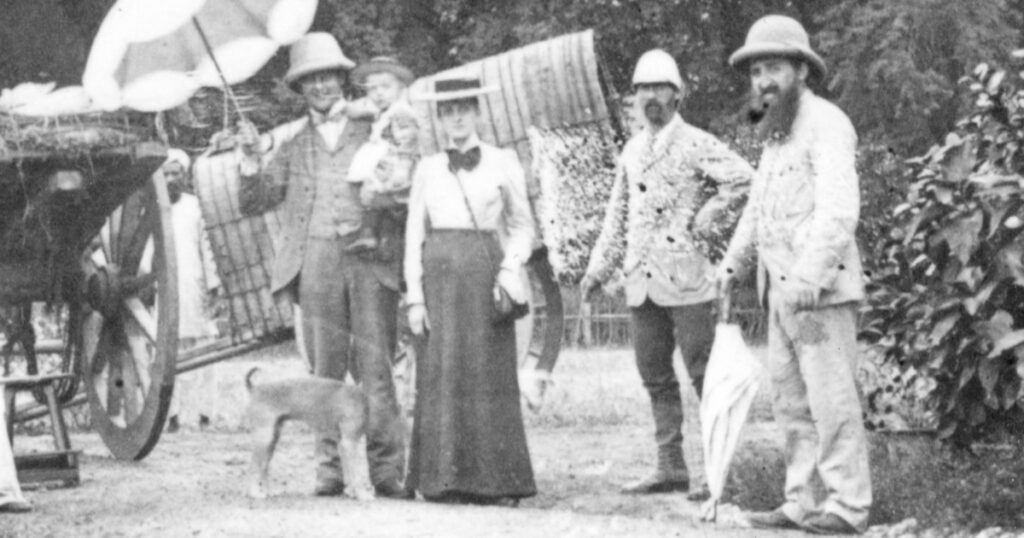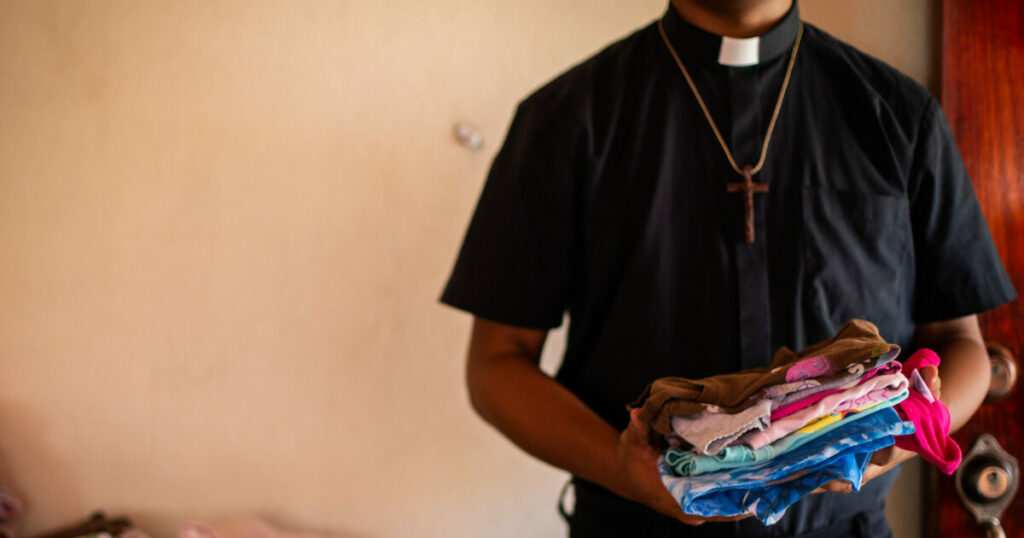By David Van Rooy
Not by the Easy Road
“The crucible is for silver, and the furnace is for gold, and the LORD tests hearts” (Prov. 17:3).
We could not have known what lay ahead when we stepped off the aircraft into the humid Okinawan night in early March 2020 — tired, disoriented, but hopeful. Like many before us, our family accepted orders to this island in East Asia, knowing a multi-year military assignment would come with sacrifice. What we did not yet understand was that we had also arrived at the beginning of a spiritual testing.
Two weeks after our arrival, COVID-19 swept through Japan. Borders closed. Travel ceased. Quarantine restrictions locked the military community into a rhythm of isolation that would persist for more than two years. At the same time, I entered into the demanding tempo of operational life in the Western Pacific.
But the real test would not come from the field or the pace. It would come through the church.
Events that unfolded in the spring of 2021 marked the beginning of a spiritual exodus — not away from the church, but deeper into dependence on Christ. Like Israel walking into the wilderness, we left behind the comfort of custom and braced ourselves for a long journey we could not yet see the end of.
The Way of the Wilderness
“When Pharaoh let the people go, God did not lead them by way of the land of the Philistines, although that was near. For God said, ‘Lest the people change their minds when they see war and return to Egypt.’ But God led the people around by the way of the wilderness toward the Red Sea” (Ex. 13:17–18).
Okinawa is no desert of Sinai. But for us, it became a place of testing. We arrived not knowing that within two weeks Japan would shut down under some of the strictest COVID restrictions in the world. Isolation on the island was near total — no travel, no visits, very little contact with the outside world. What was already a distant and difficult duty station soon became a place of real spiritual and emotional hardship.
Some of the pressures were easy to spot — frequent deployments, long hours, the constant demands of military life. But daily life wore on the family in quieter ways as well: medical access was limited; specialist care was often unavailable; and essential food items like milk, yogurt and other staples would disappear from the shelves for weeks or months at a time. Our phones would jolt us awake in the middle of the night with alerts to seek shelter as North Korea tested intercontinental ballistic missiles overhead. Less than one hundred miles away, Chinese warships prowled the East China Sea in constant reminder of potential conflict. We were at the edge of the American empire — far from home, surrounded by growing tensions, and watching the horizon as storm clouds gathered.
In that setting, we were grateful to find a Lutheran congregation — descended from the early postwar missionary work of the LCMS and led by an expatriate pastor, ordained into the Japan Lutheran Church (JLC) decades earlier. Though not a confessional Lutheran church, the congregation used the Lutheran Service Book, gifted years earlier by LCMS chaplains and missionaries. We sang the hymns of the church and gave thanks that the Divine Service was spoken by the pastor, and, at least for a time, that the LCMS was in altar and pulpit fellowship with the JLC.
A Broken Fellowship
“Do two walk together, unless they have agreed to meet?” (Amos 3:3).
In time, differences between the JLC and the LCMS became clearer — open Communion was practiced, and a general laxity toward the doctrines of the Lutheran church were apparent. But the breaking point came not through confrontation, but by announcement.
In the spring of 2021, our pastor gathered the English-speaking congregation in the meeting room after the service. It was a bright, clear Sunday in Eastertide. We were informed that the JLC, at its recent triennial conference, had voted to ordain women to the pastoral office. The vote had passed with a comfortable majority. The pastor explained the decision in subdued tones. We listened in silence. The moment felt both inevitable and devastating.
Unsure of our next steps, I reached out to our home pastor in California, the Rev. Jeffrey Horn — a former missionary in Papua New Guinea who understood the challenges of living faithfully overseas. His gentle counsel was clear: remain under the preaching of the Word, but abstain from the altar. It was not an ideal situation, but it was the faithful path open to us. So, we stepped back in sorrow. We continued to attend the Divine Service. We heard the Word, clung to the liturgy, and remained present without partaking. This became our spiritual discipline.
The pastor was clearly grieved by our decision. He appealed to unity. He seemed torn, acknowledging our concerns yet unwilling to break from his synod. In time, we realized the fracture would not mend. One could sense the tension building in the room each Sunday during the distribution of the Sacrament. Then, quietly, another LCMS family began to abstain. Then another. By fall, the only communicant left was the pastor himself.
In Japanese culture, such visible acts of protest, however respectful, represent a significant loss of face for the person in authority. Public disagreement implies public shame. Even silent abstention can be seen as a judgment on one’s credibility or worth. For the pastor, it meant standing alone before his own congregation. For us, it meant grieving the broken fellowship without turning bitter.
What followed was an extended silence — not hostile, but heavy. We bore no resentment. But we could no longer walk together.
Manna from Heaven
“And He humbled you and let you hunger and fed you with manna … that He might make you know that man does not live by bread alone, but man lives by every word that comes from the mouth of the LORD” (Deut. 8:3).
We had stepped away from the Sacrament. We had no local pastor in fellowship with our Synod. And for a time, it felt as though our small group of confessional Lutherans were truly alone. But the Lord does not leave His people without provision. In the wilderness, He sends bread from heaven and water from the rock. He sends servants.
I wrote to Chaplain Craig Muehler, director of LCMS Ministry to the Armed Forces, shortly after ceasing communion. I explained our situation and asked whether any LCMS chaplains were stationed in Japan who might be able to assist. There were none on Okinawa. But Chaplain Muehler’s response set everything in motion. He reached out through his chaplain channels — and across them — connecting not only with LCMS chaplains, but also with our church’s missionary network throughout Asia. What followed came directly from that faithful intervention.
Navy Chaplain Erik Neider, stationed aboard the USS America, reached out first. Though based out of Sasebo in Mainland Japan, he was due for a port call in Okinawa in mere weeks — and when his ship arrived, he came ashore to serve us. Over the next year and a half, every time the America returned, so did he — to preach, to administer the Sacrament, and to shepherd the faithful. Navy Reserve Chaplain Shawn Hazel flew in during his required drill weeks, quietly ministering to our small confessional group. Missionaries Rev. Daniel Jastram, Rev. Charles Ferry, and Rev. Paul Nelson also answered the call — traveling from Tokyo, Taiwan and Indonesia to bring us Word and Sacrament quarter by quarter.
During these visits the missionaries and chaplains who came sat at our tables, broke bread with our families, and shared in fellowship that reminded us what it meant to belong to the body of Christ. They were manna in the wilderness — visible reminders that God had not forgotten us, that He works through His church, and that even in far places, the body of Christ does not forsake its members. We had prayed for one chaplain. The Lord sent a team.
And He was not done. In early 2024, three years after the breaking of fellowship, Air Force Chaplain Ryan Schnake arrived on permanent orders to Okinawa, allowing us the chance to turn over with him before our own departure. Not long after we left the island, a second Navy chaplain followed. What had once been a spiritual desert now had its own shepherds, and the faithful who remained were no longer scattered.
Looking back now, we understand that it was not by our strength, but by God’s mercy. And He provided — richly and abundantly.
Bearing the Burden Together
“We rejoice in our sufferings, knowing that suffering produces endurance, and endurance produces character, and character produces hope” (Rom. 5:3–4).
By the time we left Okinawa, we were different than when we arrived. The pressures of life there, especially during the long COVID years, had changed us. Not all families or friendships made it through. Some left early. Some drifted away. Some simply broke. The island quietly bore witness to more than a few unravelings. We grieved some of them. Others, we still carry.
But we remained. Not because we were stronger, but because the Lord sustained us. We learned, slowly and unevenly, what it means to endure — not as heroes, but as sinners under discipline. We failed plenty: We doubted, we grew weary, we lost patience. But we also learned how to repent, how to forgive, how to ask for help. We learned how to live faithfully under imperfect circumstances — sometimes with clarity, sometimes only with trust.
Michele and I did what we could to be faithful in the place where God had put us. We helped lead the congregation through uncertain times. We gave what time and energy we could to support service members and their families. We encouraged neighbors, listened to frustrations, and tried to be a steady presence when others felt isolated or overwhelmed. Sometimes that meant lending a hand. Sometimes it just meant showing up — especially when it would have been easier to withdraw.
We also came to understand that Christian endurance isn’t proven in dramatic moments, but in small ones. Sitting through services when your heart is heavy. Praying with your children when you’re not sure what to say. Choosing to stay when leaving would be easier. We didn’t do these things perfectly. But by God’s grace, we did them together.
We didn’t shield our daughters from hardship. We couldn’t. But we did walk through it as a family. And in that walk, they learned something deeper than comfort: They learned where to look when things are broken. They saw how the Lord provides in quiet, ordinary ways. They saw the church respond. They saw that faith doesn’t remove the cross — it carries it.
Looking back, we see that our time in the wilderness was not wasted. It was where we were refined.
Homecoming
“And I have come down to deliver them … and to bring them up out of that land to a good and broad land, a land flowing with milk and honey” (Ex. 3:8).
In the Lord’s time, He lifted us up and brought us home. After four and a half years of wandering and weariness, we returned to the United States — not broken, but deeply tired. And we were led to Immanuel Lutheran Church and School in Alexandria, Va.
We arrived with our feet sore — worn from the road, with our burden beginning to lift but its weight not yet forgotten. Immanuel became a place of rest for us — a faithful stop along the pilgrim’s path, where our family is nourished, restored and made ready to continue the journey.
At Immanuel Lutheran School, our daughters rise each morning to Scripture and prayer. They are surrounded by faithful teachers who confess Christ with clarity and joy. They sing the hymns of the church. They memorize the catechism. They learn to love what is good, true and beautiful. They are taught reverence for authority and grace for their neighbor. They hear of Christ crucified — not as a slogan, but as the center of everything. And through the faithful pastoral care of the Rev. Christopher Esget, both the church and school remain firmly rooted in God’s Word and the Lutheran Confessions. For that, we are deeply grateful.
In Okinawa, there were many happy moments and fond memories as well. But something vital was missing. The Sacrament was not always available, and the strength of a shared confession was often missing when we needed it most. At Immanuel, we are surrounded by those who believe and teach as we do. And that has given our family space to exhale and rest.
We didn’t seek out the hardships we faced while in Japan, yet we are grateful for how they formed and strengthened us. They taught us to hunger for the things that last. And now, we give thanks for the Lord’s provision. He led us through what we could not have endured on our own. He sent help when we didn’t know what to ask for. And He brought us to a place where we could recover, rejoice and rejoin the work He has set before us.
Immanuel. God with us. Through it all, He never leaves.
Photo: LCMS Communications/Erik M. Lunsford.






We met the Van Rooy family on Easter Sunday 2023 on the beach in Okinawa while attending the Easter sunrise service at Kadena AFB. My wife and I were visiting family who are school teachers for DOD.
In October 2001 I was deployed as an Army Reservist in support of Operation Noble Eagle to Washington DC. While there for a year I was blessed to worship weekly at Immanuel with Pastor Esget as the shepherd! It was truly home away from home. Coincidentally, I reengaged with a friend and his family who I knew from Kansas City who were members. God is good and truly works in mysterious way! To God be all glory!
Thanks be to God for His faithful chaplains! I was in remote northern Japan 2011-2018 at Misawa Air Base. After some years there without any Lutheran ministry, I experienced similar feelings of isolation as the author. Upon discovering a Lutheran chaplain at Yokosuka, I reached out to him, and he began periodic trips to our location. I encourage LCMS Ministry to the Armed Forces to be aware of these challenges facing service members in the Far East, where LCMS and its partners presence is very limited and often far away. Even streaming video from the US is not a timely option on a Sunday, being nearly one day ahead. The fields are ripe, but the laborers are few. I give thanks for those He has given us, including those who have served me and others in the past at International Lutheran Church in Seoul, Korea.
Good morning, I have a young Marine grandson in Kadena, and my wife and I are seeking some person, group, or Chaplain to reach out to him. We were in Navy I early 70s and Navigators and Chaplains helped us so much. We just want some one to come along side of him. He is so so young and far from his Virginia family. Might you know some contact? Thank you so much.
Randy Tabb
…and in the U.S. we can’t seem to get people in the pews..
What a great witness to our loving Lord and Savior!!
God bless your family. Thank you for your story. Thank you for serving our country. We love you!
Jane Thur, retired pastors wife.
Jane,
Where are you at? How are you and Pastor Thur? We think of you often.
David and June Rothchild
daver@srt.com
A few thoughts related to my own experience living in another country and apart from my Lutheran brothers and sisters:
“O LORD, you … hem me in, behind and before, and lay your hand upon me.
Where shall I go from your Spirit? Or where shall I flee from your presence?” (Psalm (139:5, 7).
“His divine power has granted to us all things that pertain to life and godliness” (2 Peter 1:3).
Indeed, if I never again heard another sermon,
I would still have the eternal testimony of Jesus’ own words (Matt. 24:35).
If I never again received absolution through a pastor,
I would still have the treasure of Christ’s own absolution (Eph. 1:7).
If I never again received a portion of the blesséd Bread and Wine on Sunday,
I would, by God’s grace, rise daily knowing that I have eternal life because Christ’s body was broken for me and his blood was shed for me (1 Cor. 11:24-25, Lam. 3:22-23).
If I never again encountered a believer from my own church body,
I would have ample reason to rejoice —
• with the inhabitants of heaven over even one sinner who repents anywhere (Luke 15:7), and
• with all those who proclaim the excellencies of him who has called them out of darkness and into his marvelous light (1 Peter 2:9).
If every copy of the Bible were destroyed, it would continue to inspire,
for “the word is near you, in your mouth and in your heart” (Ro. 10:8).
If all opportunities for Christian fellowship vanished, I would still have
• my identity as one washed to be God’s instrument (1 Cor. 6:11, Titus 3:5),
• the Holy Spirit dwelling within me (1 Cor. 6:19, 12:3; 2 Tim. 1:14),
• the abiding presence of the Good Shepherd (Ps. 23, John 10:1-5), and
• a Heavenly Father to whom I can always cry, “Abba!” (Ro. 8:15).
If no spiritual light came by way of church leaders, family, friends, or strangers,
I would still be called to convey the light of Christ myself, joyfully for their sake (John 8:12, Matt. 5:14) and to God’s own glory (Matt. 5:16, John 15:8).
“I will bless the Lord at all times; his praise shall continually be in my mouth” (Psalm 34:1).
God’s blessings to all of you